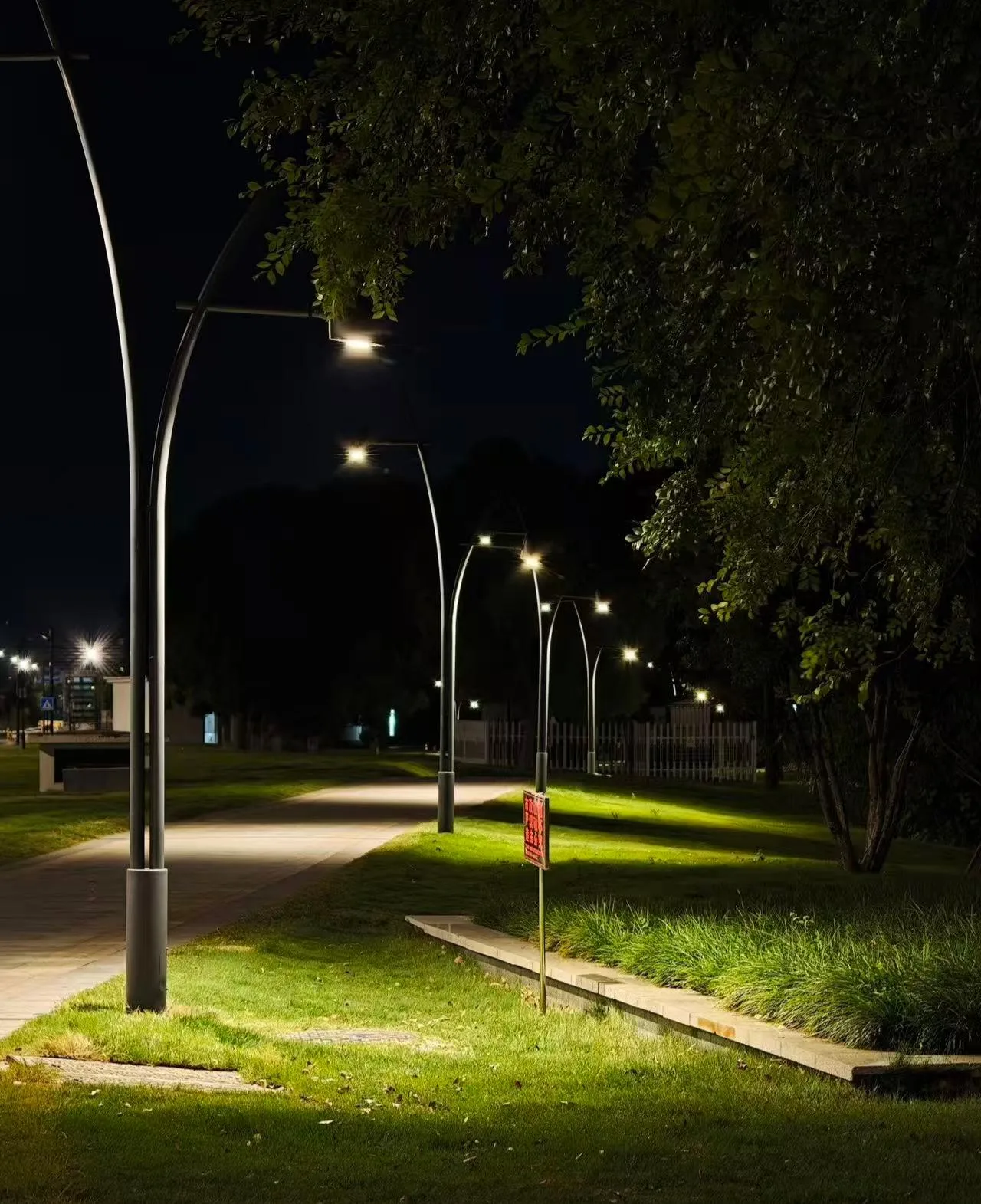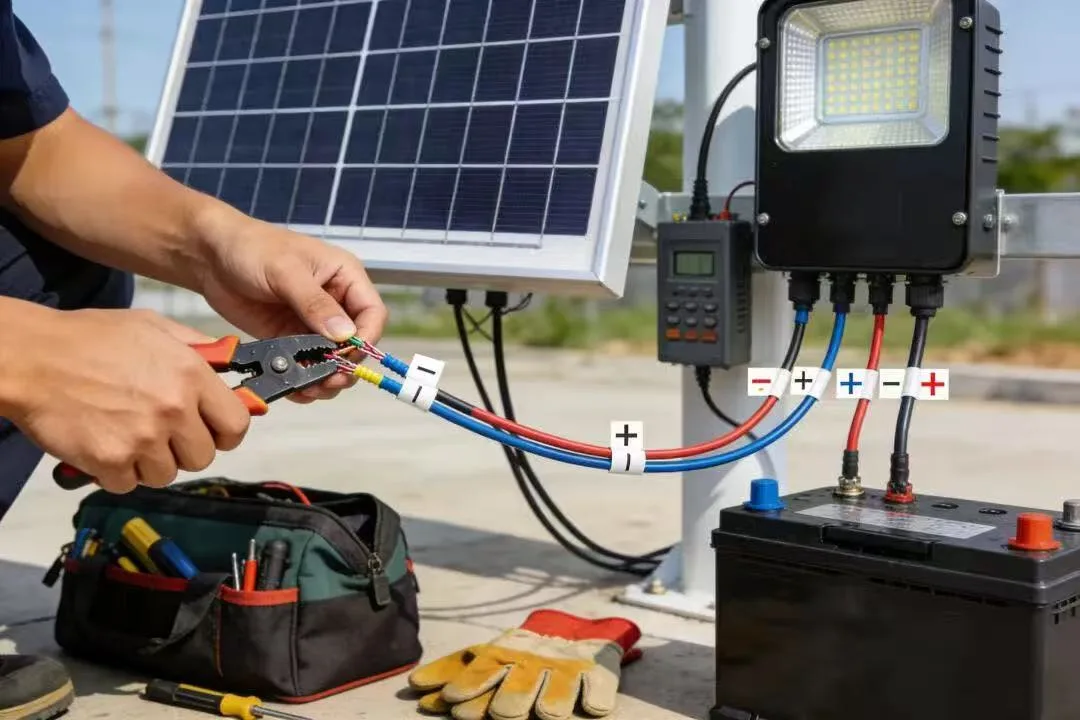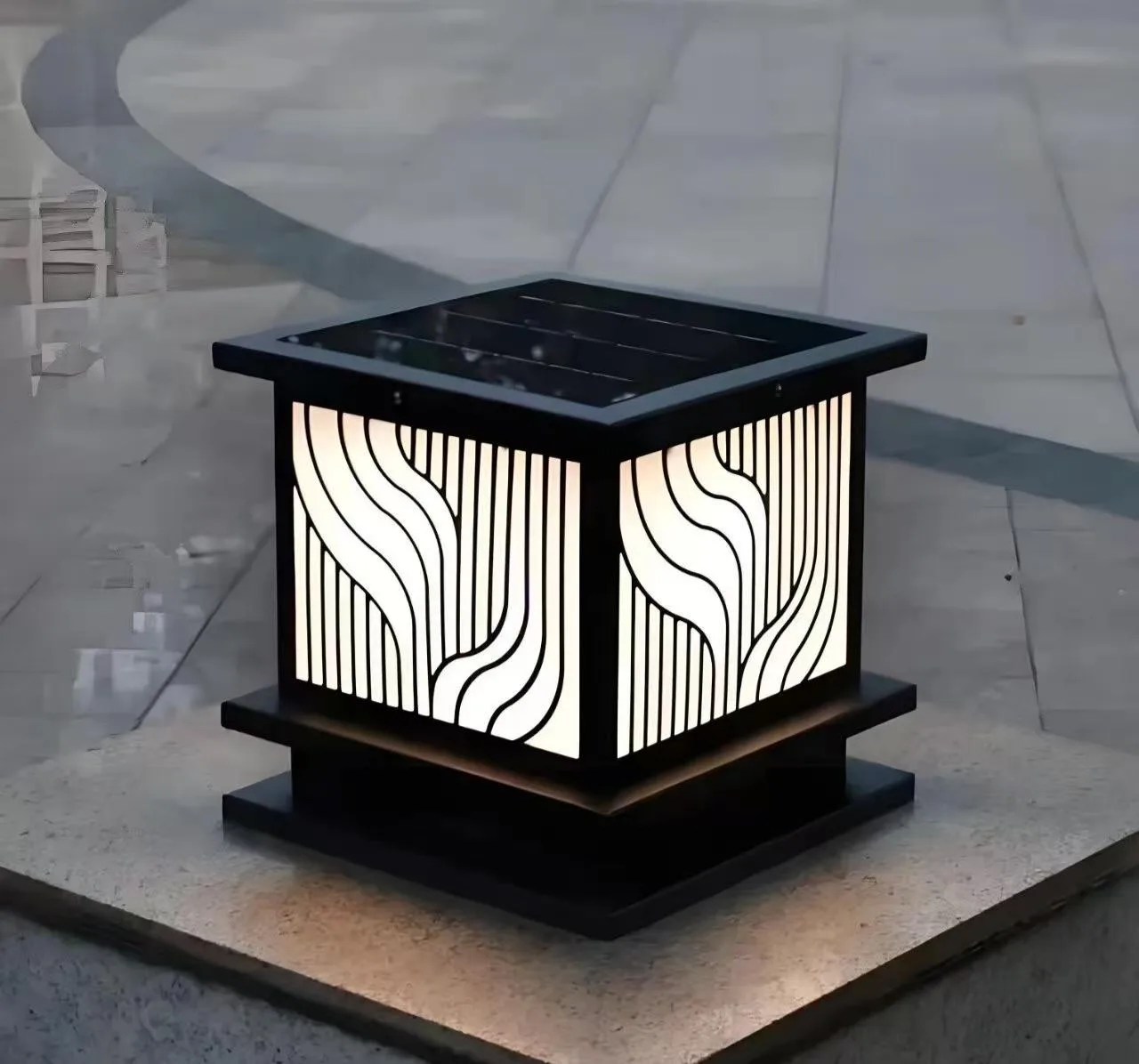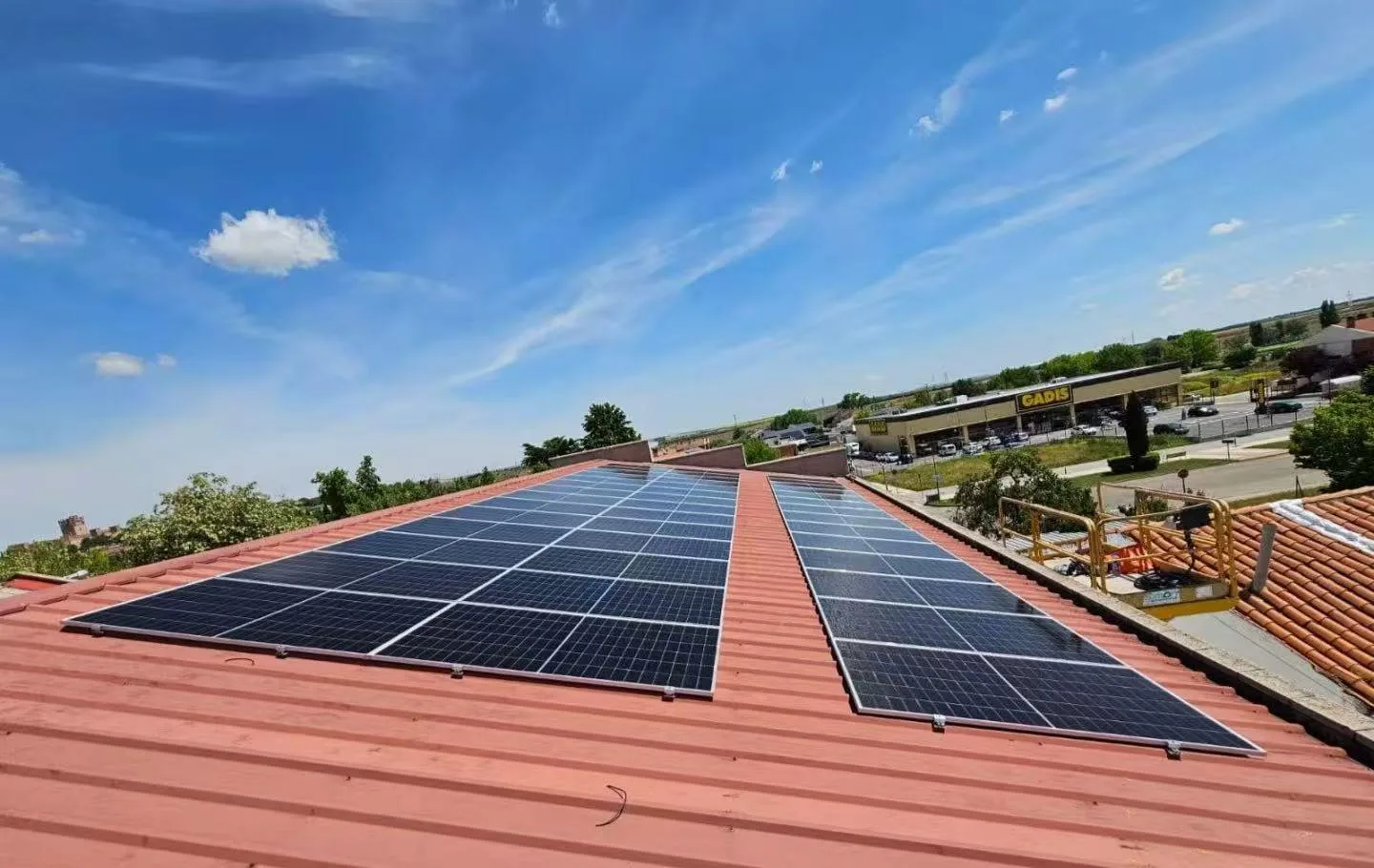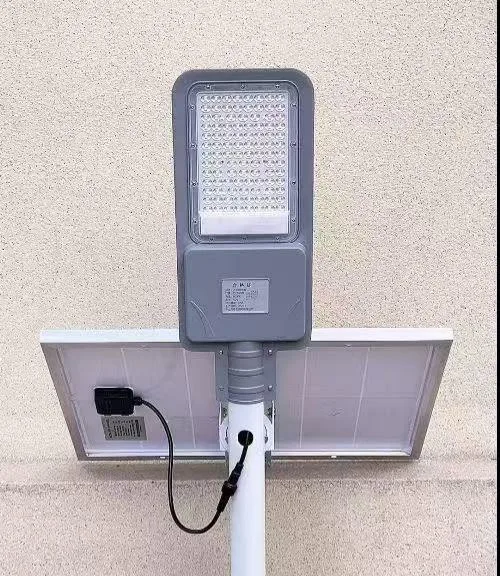Introduction:The Evolution of led street lamps
incandescent street lights
They are easy to use — they turn on as soon as they are connected to power. They provide bright, stable light.when comparing led vs incandescent street lights, Early incandescent street lights improved lighting but had low efficiency, wasting most of the electrical energy as heat. Also, their short lifespan meant frequent bulb changes, leading to high costs.
fluorescent street lights
They are much more efficient than incandescent street lights. They produce light brighter while using less electricity, which lowers energy use in led luminaires street lighting. They also last longer, so bulbs don’t need to be replaced as often. When comparing led lights vs fluorescent lights, it’s important to note they take longer to start and offer lower color rendering, which limits their use in places that require high-quality lighting.
high pressure sodium street lights
They are very efficient and work well in fog. Their yellow light can shine through mist and rain, helping drivers and pedestrians see better. This makes roads safer in bad weather. They are widely used on urban roads, highways, and other areas, providing reliable nighttime lighting for the public.
What Are led street lights?
LED street lights offer advanced solutions for urban lighting.They use up to 80% less energy and contributing to significant led street lights energy savings, can last 50,000 to 100,000 hours, and deliver superior lumen output.They have smart controls and are engineered for good performance, safety. They have immediate startup, don’t flicker, and come in different shapes like cobra-head and shoebox.
Types of street light and Where to Use Them
Choosing the right type of outdoor street light depends on the road classification, purpose, and environmental context.
cobra head led street lights
They are the most common and traditional style led street lights. They use directional lenses to give bright, focused light for long roadways. Their classic design and low energy use make them perfect for major roads and highways that require bright, uniform illumination.
shoe box led street light
They are ideal for large, open areas where wide, even light distribution is needed. Their broad optics ensure that they cover expansive spaces, reducing shadows and dark spots. You often see them in parking lots and city squares because they help people see better and feel safer in these high-traffic locations.
outdoor floodlights led
LED floodlights are a type of conventional large exterior flood lights. They give off strong, bright light and are often used in flood lighting for sports, building walls, and factories where a lot of light is needed.They are set at an angle to shine on certain spots. Unlike street lights, they can cause glare, so a flood light glare shield or cover is often used to block extra light and protect people’s eyes.
led bollard lamp
These lights are low-height fixtures often used as commercial pathway lights. They give off soft, low-glare light along walkways, gardens, and park paths. As part of low voltage landscape path lighting, they help guide people safely without being too bright. They also work well as exterior decorative lighting, adding a nice look while keeping the space safe and calm.
smart pole LEDs
These smart poles use led lights that work with 5g and often include cctv on pole setups and wifi pole features. They give bright, energy-saving light and also help cities collect data. With tools like environmental sensors and adaptive lighting controls, they support real-time traffic checks and air quality tracking. These poles are changing the way cities light streets and stay connected.

Town Street Project for a Georgian Client has implemented a pole smart system in innovation zones and biotech parks. These poles combine high-efficiency LED luminaires with data sensors, enabling real-time control, traffic analytics, and even air quality monitoring
solar powered led street lights
eco friendly street lights are a smart choice for places without power lines. These lights use a led street light solar panel to charge during the day and light up at night. As part of an off-grid solar street lighting system, they work well in remote areas, eco-parks, or places with poor power supply. Since they run on 100% renewable energy, they help cut long-term costs. Some systems even support solar street light remote monitoring and motion sensors to save more energy. While solar panels for street lights costs may be higher at first, they often save money over time.
Key Components:
Monocrystalline or polycrystalline solar panels
Lithium-ion or LiFePO₄batteries
LED fixture with optics
Controller with MPPT (Maximum Power Point Tracking) and dimming logic

How to Plan and Install LED Street Lighting Systems
Step-by-Step Guide:
Needs Assessment: Road classification, traffic flow, dark zones
Design & Simulation:Use DIALux or Relux for photometric planning
Pole Height & Spacing:Depends on road width and light type
Fixture Mounting : Secure tilt angle and fixture orientation
Wiring & Testing: Surge protection, grounding, IP-rated connectors
Commissioning:Uniformity check, glare testing, auto-dimming test
To help you understand how to plan and install LED street lighting systems, we present an
installation case from Linkolights’ customer.

Choosing the Right LED Street Light – Specs That Matter
| Parameter | Recommended Range | Application Notes |
| led wattage | 30W–250W | Selected based on height of a light pole: • 6-8m low poles (community roads): 30-70W • 10-12m main road poles: 100-180W • 14m+ high poles: 200-250W |
| CCT | 3000K–4000K | Warm white preferred (3000K-3500K): • Residential/scenic roads: 3000K (anti-glare) • Arterial roads: 4000K (high visibility) |
| Luminous Efficacy | ≥130 lm/W | 130 lm/W = industry baseline 160+ lm/W = premium energy-saving models |
| IP Rating | IP65 or higher | IP65: Dustproof + water jets IP66:Wave-resistant(mandatory for coastal/humid areas) |
| IK Rating | ik08 rating+ | IK08: 5J impact (≈1.7kg@30cm drop) IK10: 20J (vandal-proof) |
| Dimming Protocol | 0–10V/PWM/DALI/Zigbee | Multi-protocol design: • Basic projects: 0-10V • Smart cities: DALI/Zigbee (networked control) |
| Optics | Type II/III/IV/V | Matched to road width: • Narrow roads (<6m): Type II • Dual carriageways (7-12m): Type III • Plazas/intersections: Type V (circular distribution) |
Common Challenges & Solutions
Challenge Mitigation Strategy
High Initial Cost:Consider TCO (Total Cost of Ownership); ROI ≤ 3 years
Glare / Light Pollution:Use full-cutoff optics and 3000–3500K led bulb color temperature
Maintenance Access:Choose modular led light with tool-free access
Public Complaints Involve citizens in pilot programs; use warmer CCT in residential areas
The Future of LED Street Lighting – Trends to Watch
AI-powered adaptive lighting systems
Integration with urban digital twins
Advanced battery tech for solar hybrids
Low-glare optics for “Dark Sky” zones
Dynamic color and lighting for cultural or event zones
Streetlights as EV charging hubs
Why You Should Care
smart led street lighting is key to building greener, safer cities. It’s more than just a modern choice—it’s part of a larger led street lighting energy efficiency program that helps cut power use, lower bills, and improve safety. For city planners, contractors, or business owners, keeping up with new lighting tech is a smart move for the future.
Switching to LED brings clear benefits: better road safety, lower costs, and less harm to the planet. With options like smart dimming and solar, cities can reduce the carbon footprint commercial solar street lights help address. While the upfront cost of solar street light systems may vary, long-term savings often make them a smart investment.For expert advice and setup, work with trusted suppliers who can design the right solution for your project.
FAQs
what are led street lightsand how do led street lights work?
led outdoor street lights use light-emitting diodes (LEDs) to light up roads, streets, and public areas. These lights are more energy-efficient, last longer, and perform better than traditional street led lighting. LEDs work by moving electrons through a special material called a semiconductor. This creates light with little heat, which helps save energy and makes the lights last longer.
what are the benefits of led lights?
led lights for street lighting offers numerous advantages over traditional lighting:
Energy efficiency: LED lights consume less energy, reducing overall energy costs.
Long lifespan: They last up to 50,000 hours or more, reducing maintenance costs.
Improved visibility: LEDs provide better color rendering, which enhances road safety.
Environmentally friendly: They are free from toxic chemicals like mercury, making them a greener alternative.
How does the color temperature (CCT) affect LED street lights?
color temperature of led street lights impacts the quality of light and the safety of road users. For urban roads, 4000K is often preferred, as it provides a neutral white light, which is ideal for clear visibility without being too harsh. 3000K is often used in residential areas for a warmer, softer light.
What is the recommended wattage for LED street lights?
The wattage of an LED street light depends on factors like pole height and the road width:30W–250W is generally recommended based on the pole height and traffic conditions. Higher wattage is used for roads with more lanes or higher traffic volumes, ensuring sufficient brightness and uniformity.
How do smart features improve LED street lights?
Smart LED street lights are integrated with sensors, controllers, and communication systems that allow for real-time monitoring and adaptive lighting. Features include:
Motion sensing to adjust brightness based on traffic flow.
Remote control and diagnostics, enabling efficient maintenance and energy savings.
Dimming controls to reduce light levels during off-peak hours.
What is the ideal IP rating for outdoor LED street lights?
The IP rating refers to the level of protection against dust and water. For outdoor street lighting, an IP65 rating or above is ideal. This rating ensures that the light fixtures are water-resistant and dustproof, making them suitable for all weather conditions.
Can LED street lights be used in remote or off-grid areas?
Yes, solar-powered LED street lights are a great solution for off-grid or remote areas where there is no access to electrical infrastructure. These lights use solar panels to charge batteries during the day and illuminate streets at night, reducing reliance on the electrical grid and lowering installation costs.
How do you choose the right LED street light for a specific area?
When choosing LED street lights, consider the following factors:
Road classification: High-traffic areas require higher brightnessCCT and uniformity: Depending on the environment (residential, commercial), choose appropriate color temperature and ensure lighting uniformity.
Glare control: Use cut-off optics to minimize glare and enhance driver and pedestrian safety.
What are the challenges of installing LED street lighting?
While LED street lighting has many benefits, some challenges include:
High initial cost: While the long-term savings are significant, the initial investment may be higher.
Installation complexity: Involving infrastructure adjustments and ensuring proper placement and height.
Dark zones: Some areas may need additional fixtures or adjusted spacing to eliminate dark spots.
Are there certifications I should look for when purchasing LED street lights?
Yes, look for certifications like:
CE: Conformance with European safety standards.
RoHS: Restriction of hazardous substances in the lighting.
ENEC: European certification for lighting products.
DLC Premium: Recognizes high-performing energy-efficient products.
IEC60598 & ISO50001: Ensure compliance with international lighting and energy management standards.



